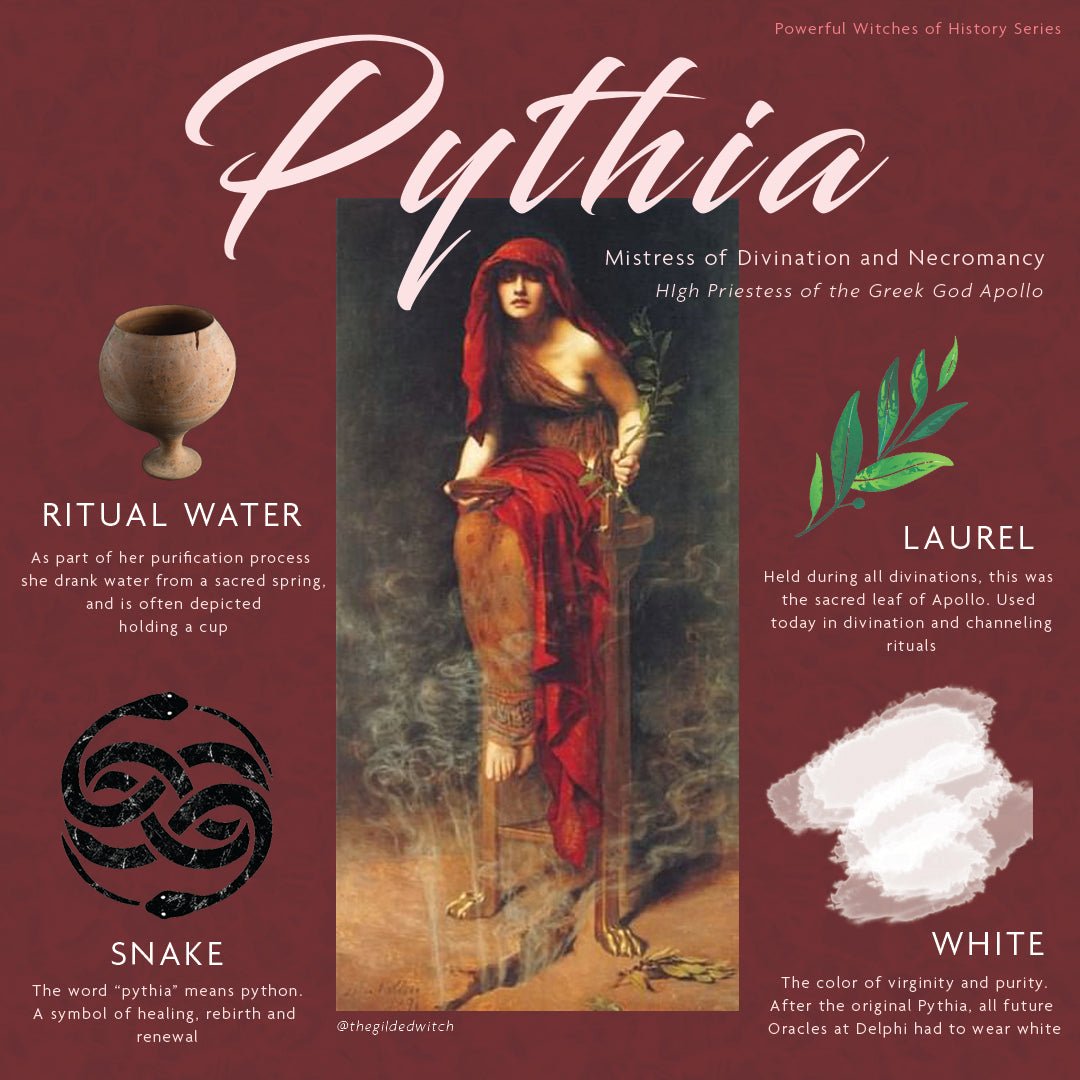Pythia - Mistress of Divination and Necromancy


Cicero, one of the greatest orators of ancient history, wrote that "divination is a presension and a knowledge of future things". In his time, prophecy and divination were a part of daily life and oracles held incredible power
PYTHIA
Pythia's orginal name was Phemonoe, a daughter of Apollo and the poet credited with the ancient Greek phrase "Know Thyself". When she became the first High Priestess of Apollo at Delphi, she planted herself in feminist history as the very first female oracle in the world. Before then, only men were thought to have the talent and ability to be the voices of the Gods on Earth.
She took up her post as the Delphic Oracle at the spot on which her father Apollo killed a giant python. When he slayed it, the creature fell so hard that he opened a massive chasm in the ground, from which issued powerful vapours called "pneuma". Pythia would breath in these vapours prior to and during her prophecies. The giant python is also how she decided on the name Pythia, which means "python".
DIVINATION

On the 7th day of every warm month Pythia would process to the nearby Castalin spring with a host of attendants and bathe herself in the purifying waters. She would also drink the waters and take a bowl-full back with her to the temple.
Likewise, the supplicants who were waiting with their questions would also go through a purification process before entering the temple and deciding upon payment for the oracle's services (the first #bosslady too!). Once they made payment, they walked down to a subterranean chamber and stood outside a door. They asked their question and, beyond the door, Pythia sat and listened from the Inner Sanctum.
In the deepest, most sacred part of the temple Pythia sat upon a tripod chair suspended over the vapour-spewing chasm. She breathed in deeply, clutching the cup of water in one hand and a sprig of laurel in the other, the leaf sacred to Apollo. After a moment she would answer the question. From reports, she entered an energetic state, answering passionately and sometimes dancing around the chasm. First-hand reports state that the prophecies ranged from clear and accurate to nonsensical and vague - whichever the oracle thought would best serve the client.
NECROMANCY
Why, you might ask, is Pythia associated with Necromancy? Pretty simple. Sometimes a person would ask about his date of death or what it would be like for him in the afterworld. In order to answer properly, Pythia would have to commune with those in the Underworld, or the dead. The Greeks believed that in order to do that, she had to "die" a little bit herself in order to access that plane of existence.
DEATH
Upon her death, every future oracle at Delphi took her name. They began as virigins clothed in white, but eventually switched to older women over 50 with the maturity and wisdom that comes with age. They also wore white in remembrance of the original tradition. Once a woman became the oracle, she would have to leave her family and live seperately until she died.
In an interesting tie-in with modern day witches, the Delphic Pythia that gave a prophecy to the deranged Emperor Nero banished him from the temple and declared he would die by the number 73. In repsonse he had her burned on the stake. In poetic justice, he died very shortly after that at the hands of a 73-year old rival.
THE LAST PROPHECY
The very last divination spoken by the last Pythia was prescient. Greece had fallen to Rome, and an attendant to the Emperor came to her about restoring the temple. She responded:
Soon thereafter a new Emperor, Theodosius II, ordered the temple closed. 15 years later Rome fell to the Visigoths.
SYMBOLS

The Laurel Leaf - the sacred leaf of Apollo. Used to make laurel wreaths and crowns, so it is often associated with education and achievement. It is also used in divination, clairvoyant and prophetic rituals.
The Snake - Pythia's namesake and a symbol of renewal and rebirth. As the snake sheds its skin, so to can we start anew. It also is associated with health and wellness, as in the twin snakes on the physicians' caduceus.
Blessed Water - purified water cleansed both Pythia and the supplicants before a divination. Today blessed water takes many forms, including Holy Water, Moon Water, and Florida Water.
The Color White - in order to fully commune with Apollo, the oracle had to be in a state of purity. Originally this included virgin purity, but over time it evolved into just the symbolism of wearing a white dress. An obvious form of this today is the white wedding dress.
The Number 7 - Pythia and future oracles only spoke prophecy on the 7th day of the warm months because 7 was the sacred number of Apollo. Today 7 is still a very mystical and relgious number: God took 7 days to create the world, there are 7 chakras in the body. It is associated with divine knowledge and wisdom.
